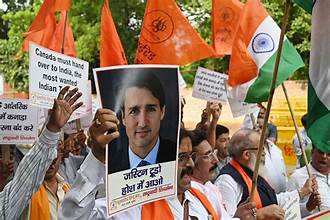On November 4, violent clashes broke out between Hindu nationalists and Sikh separatists outside the Hindu Sabha Mandir temple in Brampton, Ontario, just outside Toronto. The confrontation stemmed from a planned protest by pro-Khalistan Sikh groups against a visit by Indian consular officials, which led to physical altercations and days of unrest across Canada.
This incident highlights the worsening diplomatic rift between Canada and India, driven by allegations over the assassination of Hardeep Singh Nijjar, a Canadian citizen and prominent Khalistan advocate.
Canada-India Tensions at a Boiling Point
Canadian Prime Minister Justin Trudeau has accused the Indian government of involvement in Nijjar’s killing, stating that Canadian authorities possess credible evidence linking Indian agents to the assassination. India, however, denies these allegations, calling them “absurd and baseless.”
Hardeep Singh Nijjar, a staunch supporter of the Khalistan movement advocating for a separate Sikh homeland in India, was designated a terrorist by New Delhi. The Indian government has accused him of radicalizing Sikh communities globally.
The diplomatic standoff intensified when Canada expelled six Indian diplomats, alleging their involvement in violence and threats against pro-Khalistan activists. India retaliated by expelling six Canadian diplomats.
The History of the Khalistan Conflict
The Khalistan movement gained traction during the 1980s following the assassination of Indian Prime Minister Indira Gandhi by her Sikh bodyguards. Although its influence in India has diminished, the movement remains active among Sikh diaspora communities in Canada, the US, and the UK.
India has long accused Canada of providing a safe haven for Sikh separatists, citing incidents such as the 1985 Air India Flight 182 bombing—the deadliest terrorist attack in Canadian history—carried out by Canada-based Sikh extremists.
Canadian authorities, however, maintain that Sikhs in Canada have the right to peaceful protest and that advocating for Khalistan does not breach Canadian law. Trudeau has acknowledged the concerns but emphasized that extremist elements do not represent the broader Sikh community in Canada.
Political Fallout and Diplomatic Strains
Under the leadership of Prime Minister Narendra Modi and Justin Trudeau, India-Canada relations have deteriorated significantly. During Trudeau’s 2018 visit to India, his lack of significant diplomatic engagements and his association with Sikh separatist events fueled tensions.
In October 2024, Trudeau directly accused India’s Home Affairs Minister Amit Shah of orchestrating plots against Sikh activists in Canada. India vehemently denied these claims, with Modi labeling the allegations as unfounded provocations.
Experts believe the deep mistrust between the two governments, particularly over the Khalistan issue, has made diplomatic resolution unlikely.
Violence at Brampton Temple Sparks Global Concerns
The recent violence in Brampton involved flagpoles and fists, leading to multiple arrests and heightened security around religious sites. Brampton city officials passed laws restricting protests near temples, and a local police officer was suspended for participating in the unrest while off duty.
Modi condemned the incident, describing it as a “deliberate attack on a Hindu temple” and demanding justice from the Canadian government.
What Lies Ahead for Canada and India?
The escalating tensions pose significant risks for bilateral relations, with trade and security cooperation potentially becoming casualties of the diplomatic fallout. Analysts predict that the strained ties will remain unresolved as long as Trudeau and Modi remain in office.
With Canada’s federal elections approaching and global allies watching closely, the future of India-Canada relations remains uncertain.

